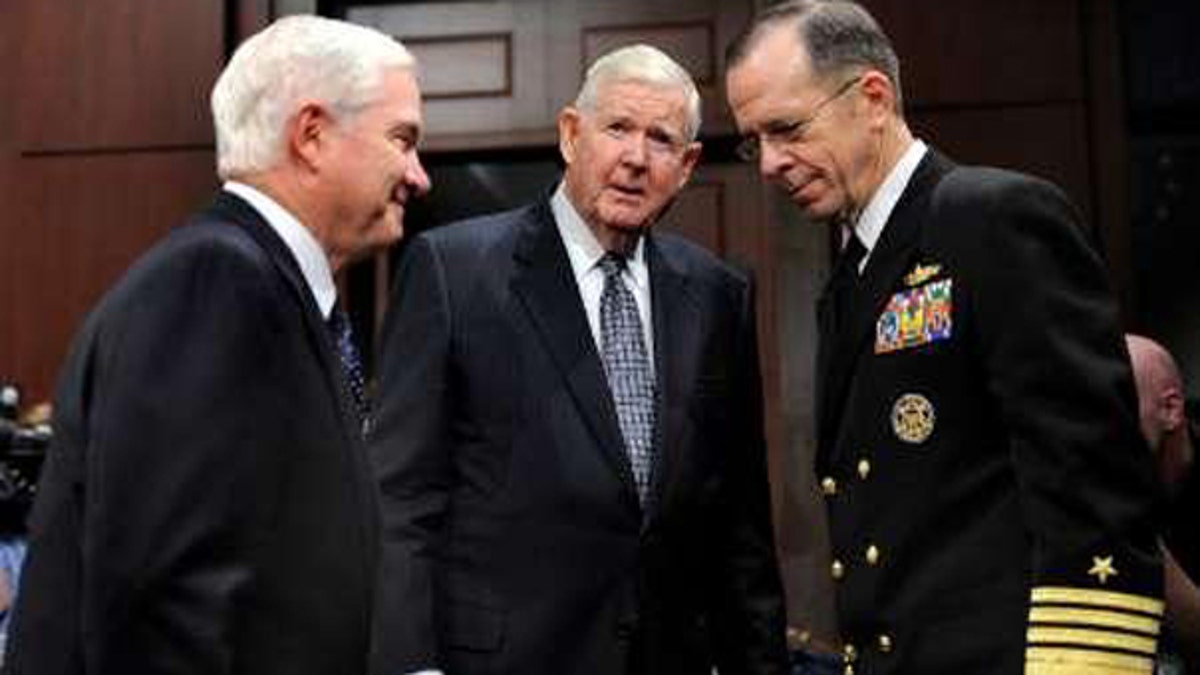
Rep. John P. Murtha, D-PA, (C) escorts Secretary of Defense Robert Gates (L) and Chairman of the Joint Chiefs of Staff Adm. Michael Mullen to testify before the House Defense Appropriations Subcommittee on the fiscal year 2010 defense budget, on Capitol Hill, May 20, 2009. (Reuters)
Democratic lawmakers continued Wednesday to voice skepticism over the planned escalation of the war in Afghanistan, though a key party leader acknowledged they probably were unable to block it.
The reaction came as President Obama's chief military and diplomatic advisers tried to sell the president's new war strategy to a divided Congress at two separate hearings.
Rep. John Murtha of Pennsylvania, a vocal war critic who is a senior House Democrat overseeing military spending, predicted that Congress would pass a $40 billion war financing bill early next year to pay for the added deployments.
Murtha said he remains unconvinced the troop increase is a good idea but believes he and other anti-war Democrats will not be able to stop it. "It's not likely that there would be any circumstances where the president would lose this battle this year," he said.
At the same time, Murtha said he didn't think more troops would make the U.S. more secure.
"Al Qaeda can go any place. They don't have to be in Afghanistan," he told reporters.
At a Senate hearing Wednesday morning, Defense Secretary Robert Gates, under tough questioning, said the Pentagon will "evaluate" next year whether the military can meet its goal of starting to withdraw troops from Afghanistan by July 2011, signaling that the withdrawal date could move back if violence spirals out of control.
Obama said in announcing the timeline Tuesday night that the withdrawal would be based on conditions on the ground. But Sen. John McCain pressed Gates on Wednesday on Capitol Hill, calling the scenario "logically incoherent" and saying the national security team needs to choose which is more important: sticking to the timeline or providing security.
Gates said U.S. forces should be able to move out of "uncontested areas" by the summer of 2011 but that the United States would not transfer security responsibility to the Afghans in any province until they can stand up on their own. He said the security team would review the situation at the end of 2010 to see whether the military "can meet that objective" with regard to the timeline.
"If it appears that the strategy's not working and that we are not going to be able to transition in 2011 then we will take a hard look at the strategy itself," he said, adding that the president reserves the right to adjust his decision. "We're not going to just throw these guys into the swimming pool and then walk away."
Gates joined other top officials before the Senate Armed Services Committee Wednesday in beginning to make the public case for Obama's decision to send 30,000 more troops to Afghanistan.
Speaking after a three months of deliberation, during which top advisers debated how heavily to target the Taliban in the country, Gates stressed that escalating the fight against the Taliban is critical to defeating Al Qaeda. He warned that U.S. failure in Afghanistan would lead to a "Taliban takeover" that could inspire Islamic extremism elsewhere.
"Rolling back the Taliban is now necessary even if not sufficient to the ultimate defeat of Al Qaeda," he said. "Failure in Afghanistan would mean a Taliban takeover of much if not most of the country and likely a renewed civil war."
Adm. Mike Mullen, chairman of the Joint Chiefs of Staff, and Secretary of State Hillary Clinton also spoke in support of the surge plan.
Mullen underscored Gates' warning that Afghanistan could again fall to the Taliban, saying the insurgency has gained influence in 11 of the country's 34 provinces.
The president has won praise from a number of lawmakers for his decision to surge in Afghanistan, though anti-war Democrats have roundly condemned the order. The president has likewise faced mixed reviews for his decision to call for troops to begin leaving the country by July 2011.
Clinton defended the decision, saying the timeline would give the Afghan government the "sense of urgency" they need to reform. Gates said the administration wants to "build a fire" under the Afghans to get them to build up their security forces.
Sen. Carl Levin, D-Mich., chairman of the Senate Armed Services Committee, agreed. He stressed that the goal needs to be to accelerate the transition to Afghan responsibility.
"An Afghan surge should be our goal and any U.S. surge should be related to that goal," Levin said.
But McCain, R-Ariz., called the withdrawal date "arbitrary" and potentially harmful.
"A date for withdrawal sends exactly the wrong message to our friends and our enemies," he said. "A withdrawal date only emboldens Al Qaeda and the Taliban while dispiriting our Afghan partners. ... Success is the real exit strategy."










































